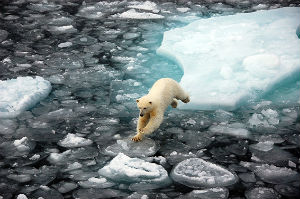Scientists launch new project to help Arctic communities better predict changing climate
Release Date 02 December 2016

The University of Reading has been handed a share of €7.5 million of funding from the EU to deliver a major project to help communities living in and around the Arctic better forecast changes in the climate.
Blue-Action is an international partnership involving scientists from the University of Reading's Meteorology department that has just launched to improve our detailed understanding of this changing climate and construct better long-term forecast systems for the Arctic and the wider northern hemisphere.
The Arctic faces rapid warming and less sea ice currently covers the Arctic Ocean than ever before at this time of the year, making understanding the processes and impacts of the increasingly extreme weather ever more important.
Professor Valerio Lucarini, Professor of Statistical Mechanics at the University of Reading said: "At a time when weather in the Arctic region is becoming more erratic, being able to make better predictions of the changing climate is crucial to protecting the livelihoods of the people who live there.
"A changing Arctic climate means a changing UK climate, with weather and climate surprises likely to become more frequent as the ice melts. Our work will ensure businesses and communities are armed with the knowledge they need to understand these changes, increase their resilience and make the plans accordingly."
Rapidly changing Arctic
As part of the four-year research and innovations project, Reading will receive €200,000 from the European Union's Horizon 2020 programme, and will work to improve long-range forecasting of hazardous weather.
Blue-Action brings together 116 experts from 40 organisations in 17 countries on three continents working in academia, local authorities and maritime industries.
Pooling their expertise, skills, approaches and networks, the partners aim to evaluate the uncertainty in current weather prediction systems and develop new techniques. This information will allow communities and businesses in Eurasia and North America to develop and plan their activities better.
Project coordinator Dr Steffen Olsen, from the Danish Meteorological Institute in Copenhagen, said: "Working directly with local communities, businesses operating in the Arctic and industrial organisations, Blue-Action will demonstrate new opportunities for growth through tailored climate services.
"These will give users the information they need to live and work safely and successfully in the rapidly changing regions in and surrounding the Arctic."
The Blue-Action project began its work on 1 December 2016, but a kick-off meeting will be held from 18-20 January 2017 at the Max Planck Society's Harnack-Haus in Berlin.
This work follows on from another EU-financed project, which Reading is also a partner on. APPLICATE is backed by €8m of funding and seeks to explore how a warming Arctic climate will impact on the weather in Britain and beyond.
For more project details, visit www.blue-action.eu
This project has received funding from the European Union’s Horizon 2020 research and innovation programme under grant agreement no 727852. In an announcement in August this year, the UK government pledged to underwrite any Horizon 2020 awards of funding, and to guarantee any grant contracts signed before the UK formally leaves the EU for their full duration.